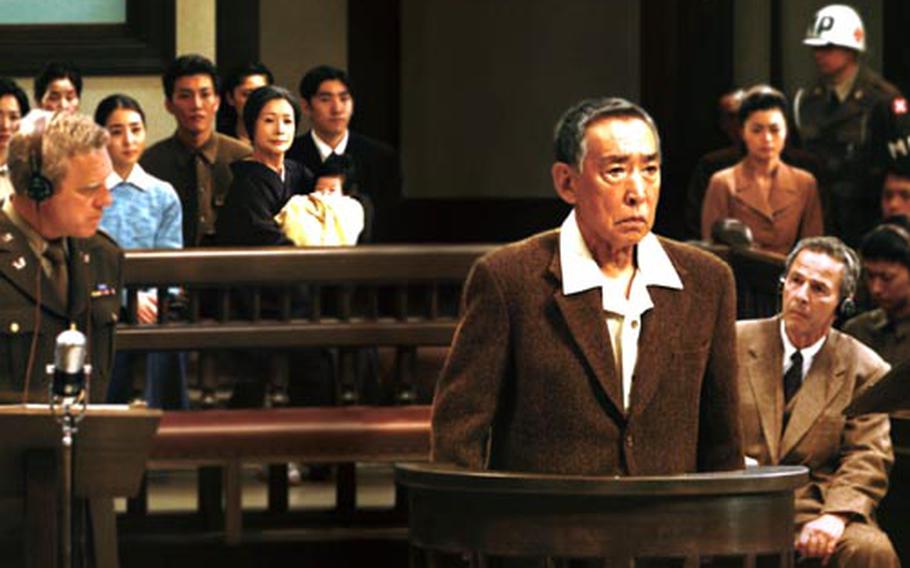
Lt. Gen. Tasuku Okada (Makoto Fujita) is testified at the Yokohama Disrict Court while Chief Prosecutor Attorney Richard F. Burnett (Fred McQueen, left) and Lt. Gen. Okada's attorney Dr. Joseph Featherstone (Robert Lesser, right) are listening. (Courtesy photo)
History’s definition of a war crime and those who commit them has proven to be intriguing and rather ambiguous pursuits of justice.
Not every wartime offense is as clear cut as the March 1968 My Lai Massacre in Vietnam, and even that tragedy has its defenders. After all, some would argue that if General Sherman’s oft-quoted “War is Hell” is accepted, so too should all its ugly consequences.
That war is hell, of course, has merit. But the reality is that even among death, destruction and tears, it has codes of conduct that, if violated, are tried. Thus, the ambiguity begins when realizing that those who are given the power to interpret justice are also those under whose system of beliefs war crimes are judged. When a sentence is handed down, the only remaining question is whether justice was truly served.
Such is the quandary surrounding the World War II-era drama “Ashita e no Yuigon” (“Best Wishes for Tomorrow”), a Japanese movie directed by Takashi Koizumi and based on a nonfiction book by Shoichi Ooka.
It was May 14, 1945 — about three months before Japan’s Emperor Hirohito accepted the terms of the Potsdam Declaration that ended World War II — when 486 U.S. Air Force B-29 bombers dropped more than 2,500 tons of ordnance upon Nagoya, seriously defacing the densely populated city in central Japan. The results were horrific: More than 300 women and children burned to death from the incendiary effects of napalm and explosions while 80 percent of northern Nagoya city, including Nagoya Castle, was destroyed.
Afterward, 38 U.S. pilots who had parachuted from their shot-up B-29s were captured, tried as war criminals and decapitated in brutal and relatively swift order.
Once the war ended in August 1945, Lt. Gen. Tasuku Okada, commander of the 13th Army District and the Tokai-gun Army, was charged as a Class-B war criminal. He was indicted for ordering the executions of the POWs without conducting a formal trial. Okada was executed by hanging in September 1949 during a period of post-war confusion.
The movie, which opened in Japanese theaters March 1, is in Japanese with English spoken by American actors in the courtroom scenes.
The action centers around the courtroom drama while doing its best to avoid the common pitfalls of many trial productions. The general assessment among reviewers is it has neither a strong protagonist nor antagonist, yet poetically unfolds — with almost “Zen-like fashion,” says one critic — somewhat sympathetically for Okada (played by Makoto Fujita) during his trial amid a country recovering from the devastation of war.
The first 10 minutes explain Picasso’s famous painting “Guernica” that depicts the suffering of Spanish civilians at the hands of the German Luftwaffe’s indiscriminate 1937 bombing of Guernica during the Spanish Civil War. Also mentioned are Japanese airstrikes against Nangking, Hankou and Chongqing during Sino-Japanese War; the Luftwaffe’s World War II bombings of London; the British Royal Air Force’s bombings of Berlin, Hamburg and
Dresden; and the U.S. Army Air Corps’ incendiary bombings of Tokyo and Nagoya and the atomic bombings of Hiroshima and Nagasaki.
The movie then shifts to the Yokohama District Court where Okada is tried by Chief Prosecutor Attorney Richard F. Burnett (Fred McQueen). Burnett accuses Okada of murder for ordering the executions without the benefit of a trial. Meanwhile, Okada’s senior counsel, Dr. Joseph Featherstone (Robert Lesser), maintains that the U.S. airmenwho had been executed were not prisoners of war as defined in the Geneva Convention, but were suspected war criminals who ignored the international laws prohibiting the bombings over Nagoya.
Inspired after perusing the 1981 disclosure of U.S. official documents, director Koizumi wrote a screenplay 14 years after reading Ooka’s novel.
The film was made with great care in an orthodox manner reminiscent of the period in which it is set, eschewing today’s editing room temptations such as the use of computer graphics.
Koizumi had already decided “Ashita e no Yuigon” would be his last movie, and did it in hopes of understanding, defining, and pursuing justice. “The most important thing to learn from histories for us is to tackle their duty of destiny given in good faith,” he said.
His best wishes are to following generations given this task.
Stripes reporter Paul Newell contributed to this report